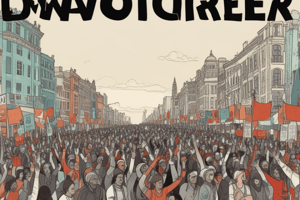Podcast
Questions and Answers
What is social change?
What is social change?
- The change of cultures and social movements that happens over time. (correct)
- The refusal to accept new cultural practices.
- A temporary change in social behavior.
- A sudden shift in government policies.
What is a social movement?
What is a social movement?
A social movement encourages or discourages social change through organized activities and represents those who feel they have no voice.
Types of social movements include ______, redemptive, reformative, and revolutionary.
Types of social movements include ______, redemptive, reformative, and revolutionary.
alternative
What is an alternative social movement?
What is an alternative social movement?
What is a redemptive social movement?
What is a redemptive social movement?
What is a reformative social movement?
What is a reformative social movement?
What is a revolutionary social movement?
What is a revolutionary social movement?
What does relative deprivation theory refer to?
What does relative deprivation theory refer to?
What are the aspects of relative deprivation theory?
What are the aspects of relative deprivation theory?
What is new social movements theory?
What is new social movements theory?
What do defensive new social movements defend?
What do defensive new social movements defend?
What do offensive new social movements aim to achieve?
What do offensive new social movements aim to achieve?
What are the stages in social movements?
What are the stages in social movements?
What happens during the emergence stage of a social movement?
What happens during the emergence stage of a social movement?
What characterizes the coalescence stage of a social movement?
What characterizes the coalescence stage of a social movement?
What is bureaucratization in social movements?
What is bureaucratization in social movements?
What are the five ways a social movement can decline?
What are the five ways a social movement can decline?
What is power?
What is power?
What is legitimate power?
What is legitimate power?
What is illegitimate power?
What is illegitimate power?
Flashcards are hidden until you start studying
Study Notes
Social Change
- Social change reflects the evolution of cultures and behavior over time.
- It encompasses shifts in attitudes, values, and societal norms.
Social Movement
- Organized activities aimed at encouraging or discouraging social change.
- Represents the voices of individuals or groups feeling marginalized or unheard.
Types of Social Movements
- Movements categorized as alternative, redemptive, reformative, or revolutionary.
Alternative Social Movement
- Focuses on limited change in specific individuals.
- Encourages personal behavior modification and attitude adjustments, e.g., Drug Abuse Resistance Education.
Redemptive Social Movement
- Seeks radical transformation in individuals’ lives.
- Aims for sweeping changes, exemplified by the spread of Christianity.
Reformative Social Movement
- Targets limited societal change while often working within existing political frameworks.
- Examples include the same-sex marriage movement and Women's Suffrage movement.
Revolutionary Social Movement
- Pursues radical change across the entire society.
- Dissatisfied with existing structures, seeks to implement new ideologies, as seen in the Bolshevik and American Revolutions.
Relative Deprivation Theory
- Social movements arise from feelings of deprivation when groups compare themselves with others.
- Highlights the disparity between desires and reality, motivating demands for change.
Aspects of Relative Deprivation Theory
- Action arises from perceived inequalities in wealth, power, or opportunities.
- Involves a belief that conventional methods of achieving goals will not suffice.
New Social Movements Theory
- Emerged post-1960s, emphasizing changes in cultural and social values.
- Characterized by informal networks, collective identity, and a focus on emotional openness and active participation.
Defensive New Social Movements
- Focus on defending natural or social environments threatened by industrialization and technological risks.
- Aims to counteract government control and protect societal well-being.
Offensive New Social Movements
- Advocate for extending social rights for marginalized or repressed individuals.
- Seek recognition and empowerment against state repression.
Stages in Social Movements
- Emergence: Activists identify a social issue and initiate lobbying.
- Coalescence: Movement gains members, solidifies strategies.
- Bureaucratisation: Movement adopts organized structures and becomes established.
- Decline: Possible results include goal achievement, failure, co-optation, repression, or mainstream establishment.
Power
- Defined as the capacity to realize desired goals despite resistance or opposition.
Legitimate Power
- Recognized authority held by individuals with rightful claims, such as elected officials or educators.
Illegitimate Power
- Power derived from coercion, often unrecognized by society, exemplified by terrorism.
Studying That Suits You
Use AI to generate personalized quizzes and flashcards to suit your learning preferences.




